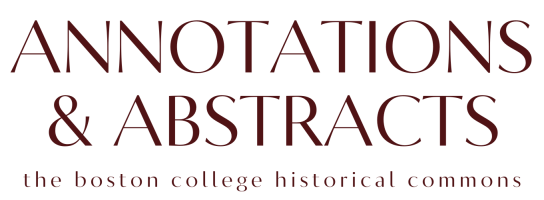In a now famous 1934 letter to the Soviet Premier Joseph Stalin, Scottish communist Harry Whyte argued for the inclusion of homosexual people within the Communist Party and communism as an institution in the USSR. Whyte makes a variety of arguments throughout the letter for the inclusion of homosexual people within the Communist Party, many […]
Education of Oppression: Slaveholding in Southern Childhood
From the moment white boys and girls were born to slaveholding parents, enslaved people were to call the children Master or Mistress. Failure to do so resulted in punishment. Demanding deference from enslaved people was the first step in educating white children to manage and discipline enslaved persons. Instruction lasted from birth until adulthood as […]
Les Camisards: Child Prophecy in “A Cry from the Desart” and “Le Theatre Sacre”
When the Camisards fled to England, their Protestant ally, they attracted a lot of attention, especially as they began to convert English Dissenters from the middling and upper classes, who adopted their sensational practices. Some of the new English converts were very well connected, such as Justice of the Peace, John Lacy, and there is […]
- History
- ...
Battles for German Victimhood in “Die Mörder sind unter uns”
The German film industry was an integral part of the Third Reich’s propaganda machine. Leni Riefenstahl’s Triumph of the Will and Veit Harlan’s Jud Süß often come to mind when describing this era of fascist film. What, then, did occupying authorities do with this multimillion Reichsmark industry after Germany’s unconditional surrender? The short answer is […]
Modern Murals: History Unknown?
Murals are not often thought of as a historical source, but scholars should consider murals as part of the historical record. These artworks have a long history. The idea of applying paint to a wall to communicate an idea or commemorate an event harkens back to the times of human cave dwelling. From ancient civilizations […]
Famine, Social Disorder, and the Writing Down of Buddhist Scripture: Did the Eruption of Alaska’s Okmok Volcano affect Indian Civilization in the first century BCE?
Editor’s Note: This week, we are delighted to feature a guest post written by Jamie Flynn, a graduate student at Yale University! The research I would like to showcase in this blog post is an interdisciplinary project building on a paper recently published by one of my professors at Yale, Joseph Manning. I am spending […]
The Firth of Forth: What Separates Your Picts from Your Angles?
Today, if you travel from the Scottish city of Edinburgh north towards the region of Fife, you’ll pass over the impressive Queensferry Crossing bridge, which will take you across the wide watery Firth and Forth that separates Lothian (the area around Edinburgh) from Fife. It’s a quick trip, a great view, and thousands of cars […]
How Irish Women Remember the Revolution: Gendered Constructions of Memory in Personal Narratives
As Ireland celebrates the Decade of Centenaries, ten years of events commemorating the Irish Revolution, some commentators have noted a curious phenomena in the representation of women. Despite the increased attention to women’s involvement in the revolution, the women remembered were considered “exceptional” or as existing apart from revolutionary men. The noted scholar Oona Frawley […]
A Short Life and a Merry One: Empire, Family, and Confraternity in the Journal of Captain Jack Cremer
“’If youth did know whate Age doth Crave Manney a penny they would save.’ But I was always for a Short life and Merry one.” – Ramblin’ Jack By the eighteenth century, Britain had solidified its status as a nation heavily supported by sea trade. In the previous century England had emerged as an imperial […]
Language and Liturgy: The Relationship between Religion and the Irish
Celtic languages have declined significantly in the last millennium despite once dominating the British Isles. The Irish language especially has diminished significantly despite once covering the whole of Ireland. Many scholars have attributed this decline to political, economic, and social factors, but the role of religion remains underexplored. The 16th through 18th centuries in particular […]
